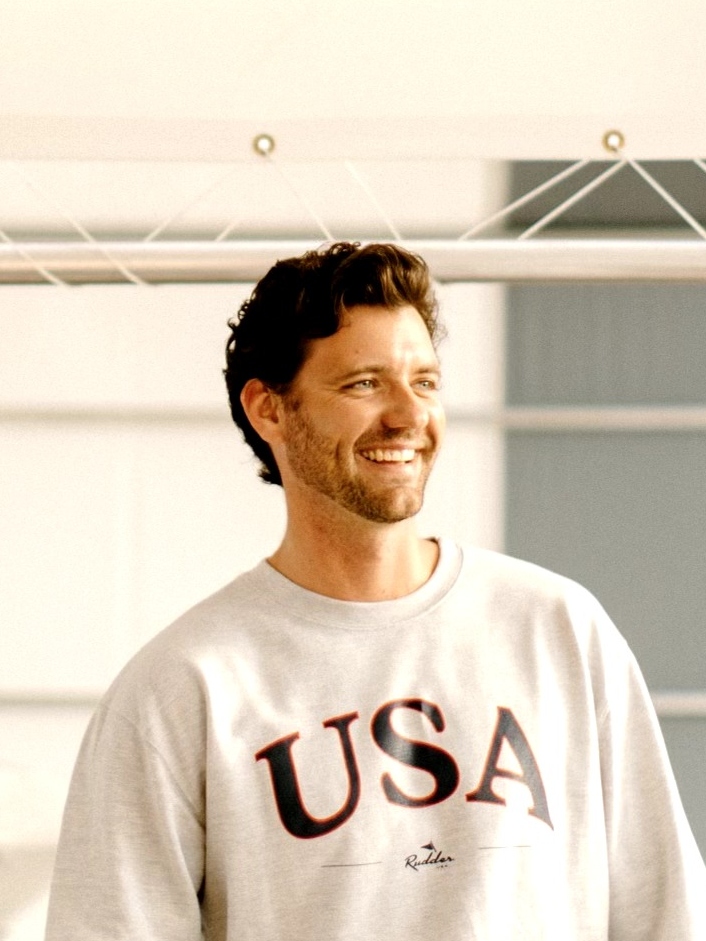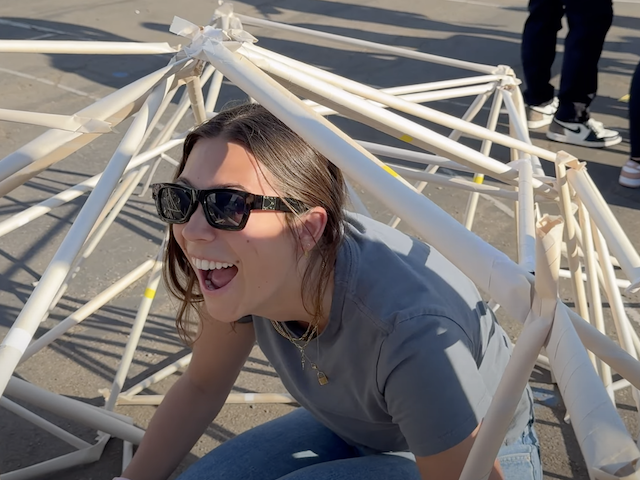Changemaker Challenge Winner Proposes Label for Water-Efficient Produce
 USD Changemaker Challenge finalists found out the results — final votes and prize money — of their videos that proposed water conservation and consumption issues.
USD Changemaker Challenge finalists found out the results — final votes and prize money — of their videos that proposed water conservation and consumption issues.If seeing is believing, then the idea that University of San Diego students Sarah McWilliams, Katie Panagopoulos and James Pala proposed in their video entry for the Changemaker Challenge provides a very feasible solution.
The team, competing in the formerly springtime event but now held in the fall, earned the highest online vote total — 382 — among seven finalists for its video (see below) on the USD Changemaker Hub Facebook Changemaker Challenge page and won the largest share of a $6,000 prize money pool, $1,671.77, for its water conservation-themed idea. Their idea was to create a label that identifies produce that has been produced by more water-efficient methods.
"We want to educate the consumer," said Pala, a first-year USD student who is also enrolled in the on-campus San Diego Naval Reserve Officer Training Corps (NROTC) program. Having a label on produce not only engages and informs, but with it, "there would be people who would be specifically motivated to buy it."
The idea of a visible label doesn't seem far-fetched when one considers already familiar organic foods sections in markets or similar notations of gluten-free products, non-GMO items, and even beyond food items, where buildings are LEED certified, etc.
"Producers always want to find a way to differentiate themselves," Pala said.
Given that a majority of water resources, especially in California, are utilized by agriculture sources, the idea of having a label on a product that touts being respectful of water consumption would seemingly increase consumer confidence.
On USD’s campus, Pala and Co. figure to have some resources — the Office of Sustainability, the School of Law and Auxiliary Services — if they want to continue this kind of movement.
The label was a hit with voters in the Changemaker Challenge, but with 52 entries, it wasn't the only notable video idea to recommend ways to conserve water and educate the public about this important resource.
The next highest video vote and prize money total went to Track H2Go with 294 votes and $1,271.45. Senior Environmental Studies majors Claire Flynn and Shannon Kuzmick want to create a mobile app that tracks an individual's water use. As this information logs one’s water-consuming activities, a points system is in place for each activity. From that, a designated international organization would match these points with a dollar amount. As money is raised, the mobile app user can donate to the international water project of their choice. Thus, this app raises a person's awareness of its local water usage while also helping an international organization's efforts to provide water resources around the world.
"We figure that creating an app is great way to reach a lot of people about this social issue and the impact it can have," Kuzmick said. Her suggestion for USD is that the app could be introduced at first-year and new student orientation so that learning about water conservation is instilled right away for those living on campus and beyond.
Two additional Changemaker Challenge ideas to surpass 200 votes were one team's desire to ban all plastic water bottle sales on campus (232 votes, $1,015.32) and an intriguing idea of installing laundry cyclers on campus (230 votes, $1,006.52). A stationary bike washes a load of laundry as you exercise. According to the team of Denise DeForest, Cecilia Pho and Camille Contreras, the bike's system takes less water to wash clothes and could potentially save more than 50,000 gallons of water a week at USD.
Three other finalists received fewer votes, but still earned some prize money:
• "What Goes into Your Meat?" was a student awareness campaign about the meat industry and its impact on water consumption. The team of Danya Moodabagil, Riley Worthington, Lara Yovanovich and Isabella Avila sought to better educate students about the amount of water used in most meats and to consider limiting meat consumption. This idea received 123 votes and $538.29.
• USD Sustain, a mobile app idea by Angela Marie Hessenius, seeks to have all members of the USD community easily enter their water-use information to track their water conservation progress and provide total quantities of gallons of water saved. USD Sustain received 62 votes and $286.65.
• The last finalist, receiving 48 votes and $210, was a community education program designed to have students work alongside a community partner, RefugeeNet, in nearby City Heights to connect with the refugee population — adults and children — to provide access to information about water consumption and conservation. The idea was put forth by James Barrett, Ysera Liu, Austin Galy and Katherine Kovach-Galton.
Another important aspect of the Changemaker Challenge is that many of this semester’s entries were class projects. Courses taught by Political Science and International Relations Professor Mike Williams, Sociology Professors Lisa Nunn and Adina Batnitzky and International Relations Visiting Professor Jonathan Wadley required students to enter.
In announcing the results of the Changemaker Challenge on Monday, Williams, who is the Changemaker Hub director, encouraged finalists to consider entering USD's 2017 Social Innovation Challenge and carry their ideas forward.
— Ryan T. Blystone



